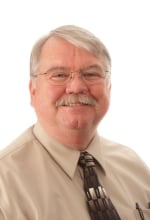
“How long can you live without water? About a week. Without food? About a month. Without oxygen? Six minutes. After six minutes, you’re brain-dead,” says Dr. Tom Baxter, director of Northern Kentucky University’s Respiratory Care program.
He highlights the crucial role of the discipline in patient survival.
“Respiratory therapists are at the head of the bed at every cardiac arrest,” Dr. Baxter said. “We’re the ones who help put the tube down the patient’s throat. We’re squeezing the bag. We’re running the ventilator that’s keeping COVID-19 patients alive. We make sure that the airway stays in place and that the patient is breathing.”
He is excited to see NKU make the Bachelor of Science in Respiratory Therapy program more widely available by offering it online. As a relatively new specialty compared to nursing, respiratory therapy is getting plenty of attention during the pandemic.
“We have gotten more positive press out of the coronavirus,” he said. “That’s the silver lining in a very dark cloud. As a profession, we’ve been almost invisible. We were searching for that identity, and the pandemic helped us find it.”
Leveling Up
NKU’s BS in Respiratory Therapy completion program is designed for associate degree students who have already passed their registry exam and are practicing in the field.
“This will take them up a notch,” Dr. Baxter said.
When he took over as director, he made modifications to the program in order to increase local exposure. In addition, he was instrumental in getting the program accredited through the Commission on Accreditation for Respiratory Care (CoARC).
Dr. Baxter is seeing more students develop their careers in a growing field. In 2018, the American Association of Respiratory Care issued a statement requiring all therapists to have completed or be working toward a bachelor’s degree by 2030.
“The B.S. in Respiratory Care program gives the working therapist a chance at entry-level supervision and a background in both management and education,” he said.
“Graduates can set up their own practice under supervision of a physician, just like nurses do,” Dr. Baxter said. “They’ll be doing more advanced procedures than the typical respiratory therapist.”
Digging Deep
Dr. Baxter has been in the field of respiratory care since 1970 and in respiratory education since 1981.
Watching his father — an emphysema, diabetes and high blood pressure patient — receive sub-par healthcare motivated Dr. Baxter, then a high school student, to do better. After his father died in 1970, he entered the medical field as a new high school graduate.
He trained to become a physician’s assistant but a change of heart and encouragement from his wife led him to opt for respiratory therapy instead. On-the-job training gave him a start, with schools in Kentucky, South Carolina and Ohio rounding out his education.
Working in university hospitals across the country kindled Dr. Baxter’s love of teaching, which he considers both an art and a science.
“By practice, you develop your art. By education, you develop your science. I wanted to continue educating myself and learn how to be a good educator,” he said.
In 2011, Dr. Baxter finally earned his doctorate in education, meeting a goal he had set for himself nearly 40 years before.
He recalled the time his father asked him what he was going to do with his college education. His response: “I don’t know. Maybe I’ll just be an educated ditch digger.” His father’s reply: “Well, be the best damn ditch digger you can be.”
“So that’s what I’ve been trying to do for all these years,” Dr. Baxter said.
Life Support
At NKU, Dr. Baxter oversaw the creation of a program designed to turn students into better respiratory therapists. Half the coursework is outside of respiratory care, with some of it involving leadership training.
“We want students to see more of the general management side of healthcare instead of specifically respiratory management. We’re trying to prepare them for supervisor, team leader or shift supervisor roles.”
The B.S. in Respiratory Therapy program also covers advanced pathophysiology, X-ray interpretation, CT scans, bronchoscopy and more cutting-edge procedures than is typical for respiratory therapists.
Starting this fall, students will be able to take a course in advanced mechanical ventilation — a brand new offering that Dr. Baxter is developing in response to the COVID-19 pandemic. He touches on the opportunity to do work that makes a difference.
“Respiratory care is not a job. It’s a career. The scope is so wide. We cover the entire age range of patient, from newborn babies to geriatrics. What I like to tell my students is, we’re there from the first breath to the last breath.”
Learn more about the NKU Bachelor of Science in Respiratory Therapy online program.